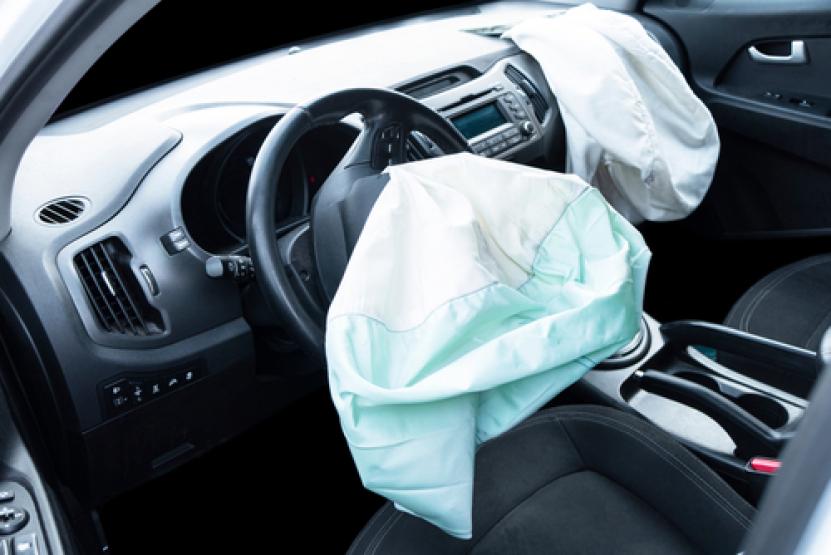Everything You Need to Know About the Takata Airbag Recall

The National Highway Traffic Safety Administration (NHTSA) is calling the Takata airbags recall the "largest and most complex safety recall in U.S. history." By the end of 2022, a total of 67 million airbags have been recalled, by 19 different automakers, including their 34 brands, in order to replace frontal airbags on the driver's side or passenger's side. The reason behind the recall comes after it was found that those airbags could deploy explosively, injuring and even killing car occupants.
The Dangers Behind the Takata Airbags
The Takata airbags, created by the now bankrupt Japanese company known as the Takata Corporation, were installed in cars mostly from 2002 through 2015. Since 2009, there have been roughly 30 deaths worldwide, 24 of which were in the U.S., and more than 400 injuries in various automakers' vehicles, all of which were connected to one thing, the Takata airbags. The NHTSA reported that the root cause of the exploding airbags comes from the design and the chemical compound the company used to inflate the airbags. The design of the airbag had a metal cartridge that is loaded with ammonium-nitrate-based propellant, a cost-efficient fertilizer and highly-flammable chemical that is typically found in bombs.
The issue with the chemical used is that Takata did not load the compound with a chemical drying agent. Without the drying agent, as environmental moisture, high temperatures, and the overall aging of the airbag take place, in the case of an accident, or in some instances, environmental changes, the inflator's housing could rupture. This rupture has the capability to propel metal shards from the airbag that can be sprayed throughout the passenger cabin, leaving those in the vehicle either severely injured or dead.
Vehicles Currently Recalled Due to the Takata Airbags
Over the years, various announcements have been made as the recall has grown to include 67 million airbags from over 47 million vehicles nationwide. The auto companies that have released recalls due to the Takata airbags include the following:
- BMW
- Chrysler
- Ferrari
- Ford
- General Motors
- Honda
- Jaguar/Land Rover
- Mazda
- Mercedes-Benz
- Mitsubishi
- Nissan
- Subaru
- Tesla
- Toyota
- Volkswagen/Audi
The recalls have been conducted in waves, prioritizing those car models flagged as an extreme risk to drivers. Examples of those models flagged as extreme risk include the 1999 BMW 323i and 328i, specific models of the 2001-2003 Honda and Acura models containing the "alpha" airbags, and the 2006 Ford Ranger and Mazda B-Series pickup trucks. The NHTSA advises drivers with vehicle models that fall under the extreme risk category to not drive their vehicles and to seek immediate repairs.
Other risk factors for recalls involving vehicles with the Takata airbag include the vehicle’s location. As previously mentioned, the Takata inflators are sensitive to changes in their environment, like high humidity and high-temperature conditions, so certain areas have been prioritized over others. What does this mean for your vehicle? For some, it could mean the difference between life and death.
While those who are located in more northern and less-humid areas may be further on the list of repairs, depending on the brand, it is still vital for drivers to contact their dealership to learn when they are expected to come in for repairs. In some cases, vehicle owners who purchased their cars secondhand may not have their cars registered in one of the priority zones, but the vehicle could have spent time there, raising the risk factor. Drivers can review the NHTSA's report or head over to our Takata Lawsuit page for a complete and comprehensive list of the vehicles containing the Takata airbags.
In January 2017, Takata pled guilty to criminal misconduct and reached a $1 billion settlement with the U.S. Department of Justice. According to the suit, $850 million of the sum went to the automakers impacted by defective Takata airbags, and $25 million served as a fine. However, the remaining $125 million was geared toward victim compensation. Due to the compensation cost, Takata was forced to file Chapter 11 bankruptcy in the United States. If you were injured by a Takata airbag, you may be eligible for financial compensation, to learn more, you can connect with one of our attorneys today.


